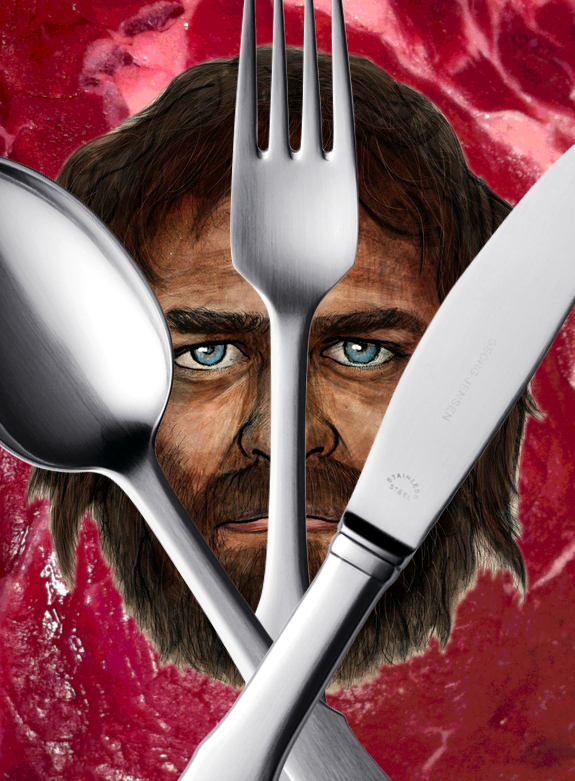Research ruminates on food evolution
 Humans spend much less time chewing than our primate cousins, and it may have actually helped us evolve.
Humans spend much less time chewing than our primate cousins, and it may have actually helped us evolve.
Our closest relatives, chimpanzees, spend almost half their day chewing, and with much greater force, leading researchers to wonder what made early man so much better at it.
According to a new Harvard study, our ancestors between 2 and 3 million years ago started to spend far less time and effort chewing by adding meat to their diet and by using stone tools to process their food.
The researchers estimate that such a diet would have saved early humans as many as 2.5 million chews per year, and made possible further changes that helped make us human.
There has been a mysterious gap in our understanding of evolution Homo erectus.
We appear to have evolved smaller teeth, smaller faces, and smaller guts, and yet managed to get more energy from food to pay for their bigger brains and bodies before cooking was invented.
“What we showed is that...by processing food, especially meat, before eating it, humans not only decrease the effort needed to chew it, but also chew it much more effectively,” said Katie Zink, first author of the Harvard study.
By changing their diets to include just 33 per cent meat, and processing their food - slicing meat and pounding vegetables - before eating, the researchers found that the muscular effort required per chew and the number of chews required per day was reduced by almost 20 per cent.
They also found that by simply slicing meat with the sorts of simple tools available more than 2 million years ago, humans were able to swallow smaller, more easily digestible pieces than would have been possible without using tools.
But measuring the chewing ability of ancient man is not particularly easy, or attractive.
Zink had to come up with innovative techniques including having people come into the lab, chew raw meat and other foods, and spit them out, and then analyse the leftovers.
To approximate the toughness and texture of the game that early humans ate, the team used goat - which subjects chewed raw while instruments attached to their jaw measured the effort involved.
Volunteers were given, in random order, a selection of foods prepared in several ways - raw, sliced, pounded and cooked goat, as well as several vegetables, including carrots, beets and yams.
After chewing each morsel until they would normally swallow, subjects spit out the food.
Zink then spread the individual food particles out onto a tray, photographed them, and digitally measured their sizes.
The team sought to determine the fine points of chewing because it is an extremely important biological function.
“Chewing is one of the key characteristics of being a mammal,” explained Harvard reserachers Daniel Lieberman, the Edwin M. Lerner II Professor of Biological Sciences.
“Most other animals, like reptiles, barely chew their food - they just swallow it whole. The evolution of the ability to chew food into smaller particles gave mammals a big boost of extra energy because smaller particles have a higher surface area to volume ratio, allowing digestive enzymes to then break food down more efficiently.”
“Meat has a lot of nutrients, but it is also very elastic. You can think of it as being like a rubber band,” Zink added.
“So the problem is that we can't break it down with our flat, low-cusped teeth. But if you slice it up, then you do not need to use your teeth to break it down as much, and you swallow much smaller particles. Cooking makes chewing even easier.
“With the origin of the genus Homo...we went from having snouts and big teeth and large chewing muscles to having smaller teeth, smaller chewing muscles, and snoutless faces,” Lieberman said.
“Those changes, and others, allowed for selection for speech and other shifts in the head, like bigger brains. Underlying that, to some extent, is the simplest technology of all: slicing meat into smaller pieces, and pounding vegetables before you chew them.
“Suppose you go out hunting for antelopes like impala or kudu, but at the end of the day you come back empty-handed, which happened fairly often for early humans.
“Chimps couldn't survive that way - they would then have to spend all night eating.
“Following the invention of hunting and gathering, though, humans can benefit from a division of labor,” he continued.
“Someone else may have come back with an impala, or some tubers you could eat. And instead of spending all night eating it, you'd spend a lot less time, energy and effort to chew it by pounding it or cutting it with just a few stone tools. What a dramatic shift!
“We are partly who we are because we chew less.”








 Print
Print